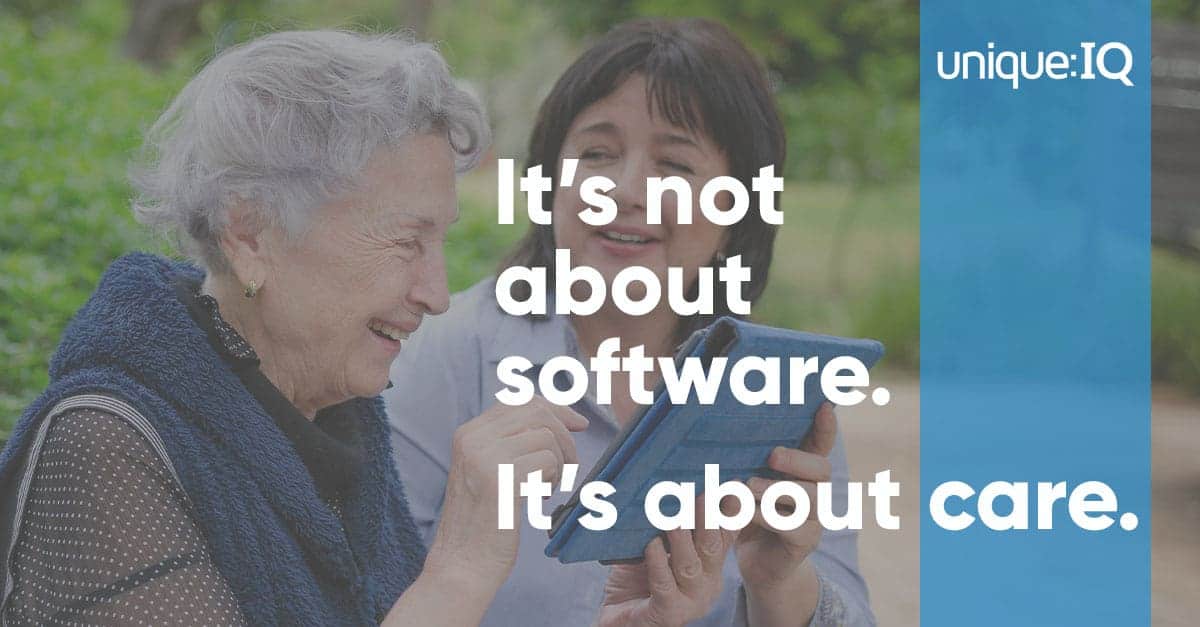
By David Lynes, Managing Director – Unique IQ
Technology continues to be one of the dominant themes of conversation in home care right now. From the ongoing digitisation of care records and businesses processes to the use of sensors and other gadgets for keeping a remote eye on those we care for, right through to AI and machine learning for large-scale trend mapping and predicting people’s behaviour, there’s barely an inch of domiciliary care that technology doesn’t touch to one degree or another.
But despite this being a hugely exciting time for embracing the potential of technology, it’s important to remember the care that’s at the centre of it. People’s quality of life and well-being, in some cases people’s lives, are dependent on the technology that we introduce into home care. And as technology providers, we have a responsibility to remember that as we strive to better our tech.
Technology is a vehicle for improving care, not replacing it
Technology should never, ever replace human contact. There is huge potential in technology driving improvements in care. The Care Quality Commission has made encouraging innovation one of its strategic priorities, recognising that digitally-enabled care can offer significant benefits to people who use services and those who run and deliver them. But not at the expense of high-quality, person-centred care.
Critics of technology-enabled care point to invasions of privacy and reduced human contact – the fear that with sensors monitoring a person’s every move and voice assistants reminding them of everything from taking their medicine to getting a drink of water, there’s no need for a care worker at all.
But there’s a genuine rationale for using technology to enhance or supplement one-to-one care.
Technology can give us more time to care, by freeing us up from admin tasks and repetitive, manual processes.
It can reduce mistakes and protect people (both those giving care and those receiving it).
And technology can help us analyse, test and predict at a scale way beyond human capacity, helping us spot early warning signs and find people the precise care they need at the moment they need it.
Technology should make carers lives easier, not harder
Technology should make life simpler, not more difficult. If a care worker is struggling to do their job because they’re fighting with a smartphone, then as technology providers, we haven’t done our jobs properly.
In the recent Sector Pulse Check survey by hft, after funding, a lack of training was highlighted as the main barrier to care providers adopting assistive technology, with 59% of those surveyed reporting that staff are unsure how to use the technology they have at their disposal.
As technology providers, we need to be trying constantly to understand how carers use our software, in situ, on a day-to-day basis; listening to issues or the way domiciliary care businesses do things. If what they’re doing sounds illogical to us, then our software probably isn’t as intuitive as we think it is, giving us an opportunity to learn and make the technology better for the people who use it day in, day out.
We set up Unique IQ to address the pain points inherent in managing remote workforces. And that’s what we always come back to when we develop our software: how can we make things easier for people, and save them time, effort or money?
Technology should focus on care, not the other way round
Likewise, as technology providers, our products should be shaped around what home care organisations are trying to achieve (i.e. care) and not expect them to fit in with how our software works.
It’s all too common for software companies to run away with creating the sexiest new tech, that’s a joy to develop and will really get them noticed. Whether or not it genuinely helps people care can be something of an after-thought at times.
But every new feature that’s developed, every new version that’s released, should meet the key criteria of “does this help home care organisations deliver better care?”.
Here at Unique IQ, it’s that attention to the end goal of our software that we feel really gets us noticed. We genuinely care about the people who use our technology, and the contribution it makes to the lives of the people they care for, however small that may be.
Our purpose is about enabling home care agencies to deliver better care to those who need it. We’re not here to make tech, we’re here to make a difference. Tech is just how we do it.
Would you like to know more?
Find out how our software can help your care organisation deliver Outstanding care and evidence the CQC’s key lines of enquiry.
